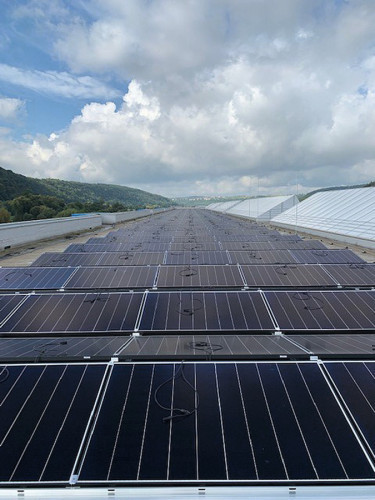Arnold Umformtechnik regularly prepares greenhouse gas balances in order to assess the company's climate protection measures. Collecting data for the carbon footprint is time-consuming and complex, but worthwhile: since 2021, production at the manufacturer of high-quality fastening systems and precision parts has been considered climate-neutral.
Against the backdrop of buzzwords such as climate change, the Kyoto Protocol and greenhouse gas emissions, industrial companies are recognizing their responsibility for future generations. Arnold Umformtechnik, international market leader for high-performance fastening systems and precision parts, is setting a good example and joining forces to further reduce energy consumption and thus greenhouse gas emissions at its production sites.
The extent of the emissions is recorded in a carbon footprint at Arnold: in 2018, a carbon footprint (also known as aCO2 or greenhouse gas footprint) was drawn up for the first time for the sites in Dörzbach, Ernsbach and Neu-Kupfer. The data required to prepare the 2021 carbon footprint is currently being collected.
With the help of KlimAktiv Consulting GmbH, a consulting company for individual climate protection strategies and climate neutrality based in Tübingen, the meaningful "treasure trove of data" is being collected and published: Greenhouse Gas Protocol (GHG) is the name of the greenhouse gas protocol that, alongside the ISO standard with the number 14064, marks the standard for the preparation of the climate balance.
The GHG Protocol is the most widely used standard for carbon footprints worldwide. In the GHG protocol,CO2 emissions are determined in so-called scopes: Scope 1 (direct emissions), Scope 2 (indirect emissions from energy purchases) and Scope 3 (upstream and downstream indirect emissions). The focus of climate neutrality is currently on Scope 1 & 2, as the data basis and ability to influence Scope 3 are not yet sufficiently available. All three scopes are recorded and analyzed in detail in the accounting.
An investment of millions for the climate
For Frank Agner, the figures in the balance sheet are very revealing. "Relevant sources of emissions in the company are identified and, as a result, sensible reduction measures can be derived to further reduce greenhouse gas emissions in the future. Against the backdrop of climate change, not only our customers but also people from the region expect more transparency about how we are making our business model even more sustainable," emphasizes the Managing Director.
The company is investing around 4 million euros in energy management by 2023. The company's energy management team is pursuing both operational and strategic goals in optimizing its own emissions. From a strategic perspective, the aim is to increase the transparency of energy flows and further reduce energy consumption. The procurement level of thermal and electrical energy is also to be reduced further in order to reduceCO2 emissions even further.
 With photovoltaics alone, Arnold will generate around 3.6 million kWh of energy per year in the futureOperativegoals in energy management are being pursued by Arnold by optimizing the lighting concept and reducing the consumption of compressed air, heating oil and electricity. The industrial company also has high hopes for heat recovery from the exhaust air in the hardening shop. In order to further reduceCO2 emissions and ensure climate-neutral production, the company plans to increase its use of green electricity. The indirectly sourced energy (Scope 2) that Arnold requires for the company's operations is already identified as energy from renewable sources through guarantees of origin.
With photovoltaics alone, Arnold will generate around 3.6 million kWh of energy per year in the futureOperativegoals in energy management are being pursued by Arnold by optimizing the lighting concept and reducing the consumption of compressed air, heating oil and electricity. The industrial company also has high hopes for heat recovery from the exhaust air in the hardening shop. In order to further reduceCO2 emissions and ensure climate-neutral production, the company plans to increase its use of green electricity. The indirectly sourced energy (Scope 2) that Arnold requires for the company's operations is already identified as energy from renewable sources through guarantees of origin.
Since 2021, the company has been offsetting unavoidable emissions in Scope 1 with Gold Standard certificates. The Gold Standard was developed in 2003 by the World Wildlife Fund (WWF) and other non-governmental organizations in order to not only emphasize the environmental compatibility of projects to reduceCO2 emissions, but also to promote sustainable development from a social perspective. The Gold Standard is regarded as one of the highest standards currently available in the field of climate protection projects.
On the recommendation of its cooperation partner KlimAktiv Consulting GmbH, Arnold has been supporting a carefully selected climate protection project since January 2021. When selecting the project, it was important for the company to support a technology-based project. Compared to reforestation projects, for example, this ensures that they actually achieve the desiredCO2 reduction.
Energy management measures
"Heat exchangers to cool the hydraulics on the hydraulic press also make sense. We are also planning to build a combined heat and power plant with absorption cooling, which will also eliminate the need for a gas boiler," emphasizes Frank Agner. In addition, the ventilation systems are gradually being converted to V-belt driven fans, which are more energy efficient. "All locations are switching to LED lighting. By replacing the light sources, we have already been able to reduce energy consumption by up to 895,000 kWh per year. This corresponds to the average annual energy consumption of around 235 four-person households," explains Frank Agner.
The Arnold Group is a wholly owned subsidiary of the globally active Würth Group, which has over 65,000 employees and 420 companies worldwide and generates over EUR 8 billion.


